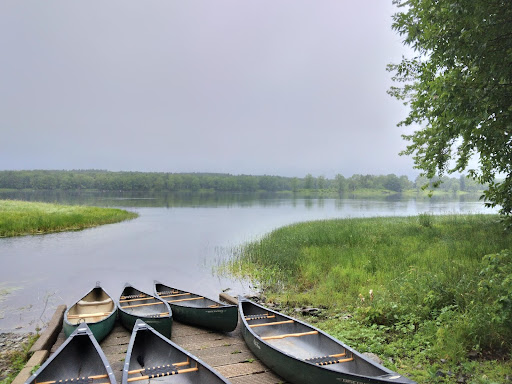
What I learned on Sugar Island time
By Joseph Hennessey
A common fallacy that the general public holds is that teachers and other public servants in education only work nine or 10 months out of the year. While this may be true in terms of direct classroom instruction, our colleagues more often than not take courses to maintain licensure and broaden their skillset or knowledge base, attend professional conferences to collaborate with others and stay up-to-date on policy and professional best practice, or undertake educational travel to remind themselves of the beauty and diversity of the world around them.
I thus count myself unusually fortunate to have been invited on a trip earlier this summer that satisfied each of the above criteria. Thanks to the generous financial sponsorship of Unum, the generous invitation of my colleague Cindy Soule, the 2021 Maine Teacher of the Year, and the more-than-generous sharing of time and knowledge by a variety of members of the Penobscot Nation, my cohort and I were able to spend several days canoeing the Penobscot River, exploring tribal lands and tribal waters, learning across a variety of fields from various subject experts, and contextualizing our learning experience in order to take it back to our classrooms in the fall. The majority of our trip was spent on Sugar Island, a beautiful and quiet place in the middle of the Penobscot River, and as a result, the progression from one learning experience to the other took place on “Sugar Island Time,” an affectionate reference to the way in which being outdoors allows one to filter out the white noise.

RIVERFRONT – The Penobscot River on a recent summer day.
During our time on the river and island, we were introduced to the traditional manner of birchbark canoe-making, the archaeological history of the Penobscot and other Wabanaki tribes in Maine and the Canadian Maritimes, the identification and explanation of herbal and natural remedies for common ailments as found on Sugar Island, and a number of ongoing policy and cultural priorities as described by those tribal members present (notably, the Wabanaki Repatriation Committee, the Native American Grave Preservation and Repatriation Act, the Smithsonian exemption, linguistic preservation and cultural preservation and celebration, among other things).
The members of the Penobscot Nation were open, charitable, and patient with all of my and my cohort’s questions and foibles through the lighthearted and more serious moments (i.e.– How ought one respond to historical mistreatment, misunderstanding, or ambiguity?); to say that the time I was invited to spend on Sugar Island and the Penobscot River was sublime and invaluable would not be a strong enough explanation.
It was a true applied learning experience in an aspect of our cultural and historical narratives which I had not spent much time in before. It is one thing to learn about Penobscot and broader Wabanaki history and issues in the abstract and quite another to be guided deliberately by those immediately acquainted with the context themselves. Upon reflection, my experience spoke to questions which Professor Rebecca Sockbeson discussed in her 2011 description of Indigenous Research Methodology: “How can/does Waponahki [Wabanaki] ways of knowing (epistemology) and ways of being (ontology) inform policy in Maine?” Both abstract and contextual study have their merits in modern education, but context is especially important when one grapples with issues of historical tension, betrayal, and irresolution. Yet, none of the grappling which was done individually, between cohort members, or among the various identities represented on the trip appeared to me as without hope and some level of pragmatic optimism.
Though my experience with “Sugar Island Time” is likely concluded (though there are many other people who will take a similar trip in the future), I look toward what comes next. Maine passed LD 291 in 2001 which required the teaching of Wabanaki Studies and then enacted compulsory study of Maine Native American history in 2003. The legal mandate for the inclusion of Indigenous education was further bolstered last year, and I am heartened by the progressive steps that my school district and the Department of Education have taken in response.
Beyond the formal study that students will receive in their social studies courses (perhaps abstract, contextual, or both), I will strive to remain more cognizant of where I might emphasize a perspective or experience that is surely more robust in my mind now than it could have been before. Across all disciplines and grade levels, the more well-rounded our students can become, the more successful our state will be.
I remain indebted to my cohort members and to the Penobscot Nation for allowing me to partake in the experience and hope to learn more in the future.
Hennessey is an English teacher at Piscataquis Community High School. He was the 2018 Piscataquis County Teacher of the Year and 2019 Maine Teacher of the Year.